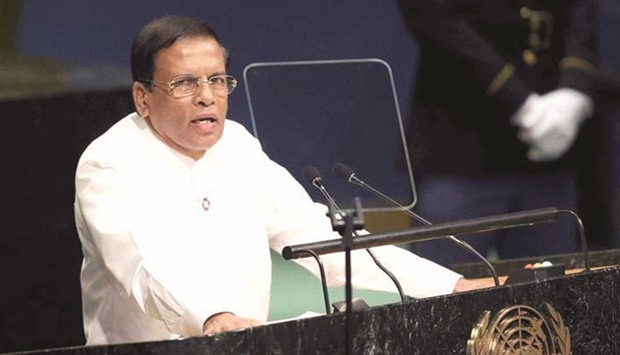Sri Lankan President Maithripala Sirisena and Prime Minister Ranil Wickremesinghe yesterday vowed to achieve reconciliation in the country, even as former strongman Mahinda Rajapakse warned the government against any steps endangering the unitary character of the state, a media report said.
Both Sirisena and Wickremesinghe renewed hope for reconciliation and economic development to be achieved by the unity government which marks its second anniversary next week.
Sirisena in his New Year message called for brotherhood and unity among all communities to achieve reconciliation following the end of nearly three decades-long civil war in 2009. Wickremesinghe said despite efforts to break up the national unity government, it would not waver in its commitment to install good governance, democracy and economic prosperity.
Former president Rajapakse, in his New Year message, warned against any action that endangers the unitary character of the state and its territorial integrity. His remarks were in reference to the government’s efforts to introduce a new constitution which is expected to grant some form of political autonomy to the minority Tamil community.
The new constitution is expected to be adopted this year after a nationwide referendum. The main opposition leader R Sampanthan echoed the Tamil wishes in his message, saying “2017 will be a crucial year in the history of our country”.
“Our expectation is that we should find a permanent and lasting solution to the national question. The new constitution in the New Year, should bring about this achievement,” he said.
The government expects the new constitution to address the demand of Tamil minorities for political recognition.
Under the 19th amendment to the constitution, the president cannot sack parliament until it completes four and a half out of its five-year term, but the prime minister will have to stand down if 113 MPs vote against him.
In theory, a united Sri Lanka Freedom Party (SLFP), of Sirisena, can expect minor Muslim and Tamil parties to support it to form a new government along with former MPs who contested on the UNP ticket at the August 2015 elections.
The unity of the fractured SLFP is the biggest threat to Wickremesinghe’s government and its failure to deliver on tackling corruption and prosecute alleged swindlers of the previous regime weighs heavily against it.
Civil society activist Sarath Wijesuriya said he could not be satisfied with the progress made by the Sirisena-Wickremesinghe administration in the past two years.
“The government should awake from its slumber of the past two years,” he said, adding that the government was protecting corrupt individuals of the previous regime.
On the brighter side, the government was able to enact the 19th amendment to the constitution which reduced the powers of the executive president, made parliament stronger and established independent commissions to depoliticise key institutions.
With the defeat of the Tamil Tigers in 2009, the Tamil groups have opted for maximum devolution as opposed to LTTE’s goal of a separate Tamil homeland.

Maithripala Sirisena in his New Year message calls for brotherhood and unity among all communities to achieve reconciliation following the end of nearly three decades-long civil war in 2009.
